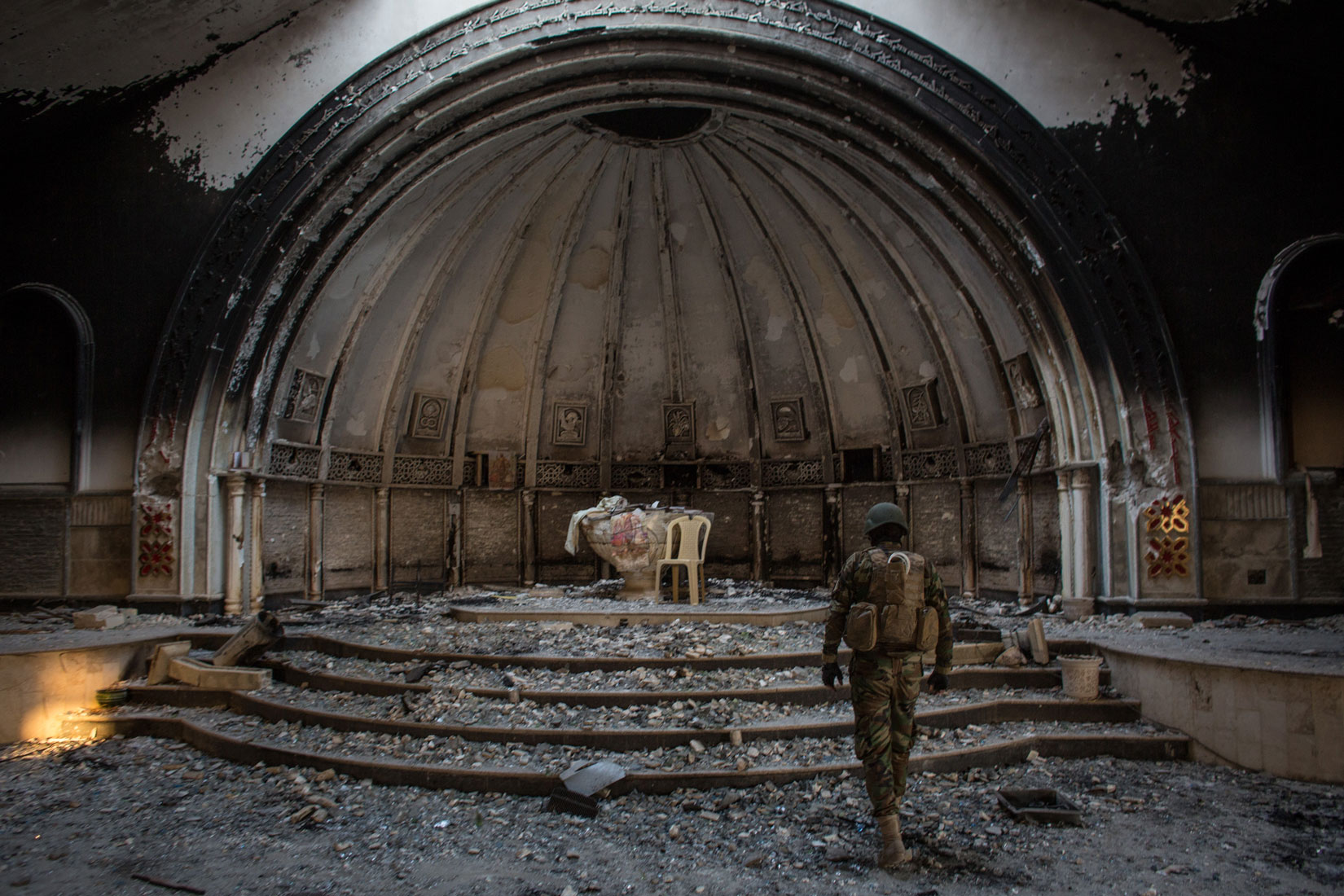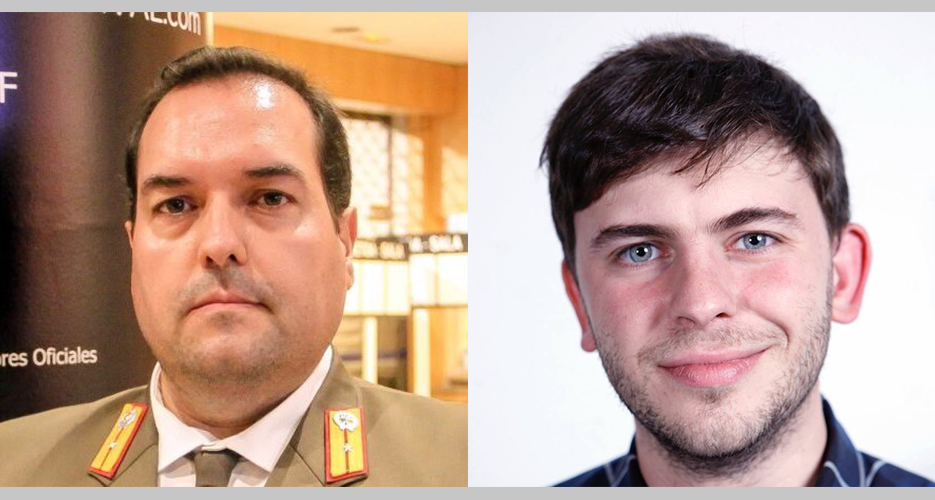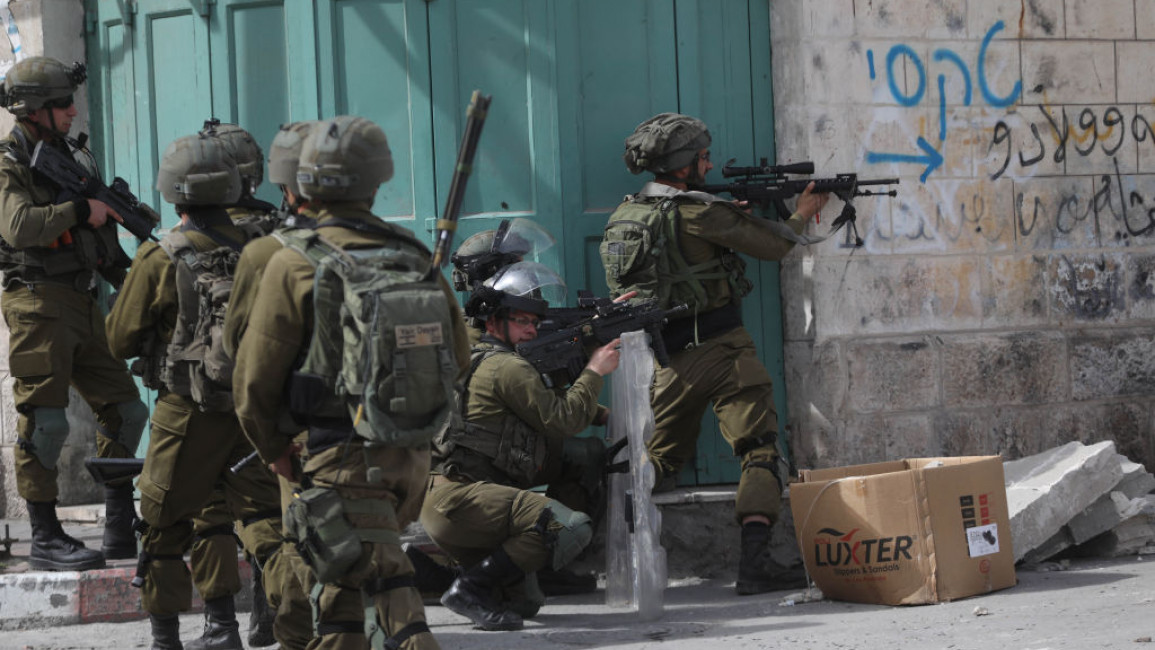Iraq’s ‘Other’ Minorities Still Endangered
Despite the defeat of ISIS, many small ethnic groups are endangered

The Islamic State group’s caliphate was mostly defeated as a territorially consolidated entity in Iraq by late 2017. Yet some of the most vulnerable peoples it targeted, such as Yazidis and Christian Assyrians, remain under existential threat.
For these peoples, the Islamic State was a nightmarish manifestation of a larger plight, which existed before the group’s rise and continued following its decline.
As chaotic, violent conflict subsumed Iraq after the invasion, it soon became clear that smaller minorities outside the country’s dominant ethnic and religious groups faced the prospect of unlimited targeted violence at the hands of militias and terrorists. Assyrians were expelled en masse from their homes in Baghdad. The vast majority of Mandaeans, who were subject to extortion and killing, had fled the country by 2007. That same year coordinated suicide attacks killed 800 Yazidis in northwest Iraq.
The Nineveh Plain, to the east and north of Mosul, the only area in Iraq that has a demographic majority of ethnic minorities, and Sinjar, the Yazidi homeland west of Mosul, became the last nexuses of potential survival for minorities. Community and political leaders advanced a plan to create a governorate in the area, using Iraq’s post-2003 legislative and political framework as the basis for local autonomy. Article 125 of the Iraqi Constitution, which legally enshrines administrative, political and cultural rights for Iraq’s various “nationalities,” became urgently relevant to areas under threat of conquest and groups under threat of genocide.
But the Kurdistan Regional Government (KRG) expanded into these territories through a repressive ethno-nationalist security and military apparatus. Sinjar and the Nineveh Plain were rendered “disputed” on the basis of the unilateral claims of Iraqi Kurdistan, which extended to non-Kurdish areas. And the regional government had the muscle to back those claims.
In Sinjar and the Nineveh Plain, political figures, community leaders, journalists and activists from minority communities who resisted the heavily armed KRG presence were harassed, beaten and even assassinated. In Baghdad, on the other hand, dysfunction, corruption and bigotry were so rampant that little to no support for minorities came from the central government. Each side cited the presence of the other as a reason to avoid investment and development.
The U.S. legitimized this condition of de facto KRG annexation through both passive and active measures. The “disputed territories” frame advanced by the KRG was accepted by the U.S., which took an ostensibly detached role, claiming that the fate of these areas was an internal Iraqi matter. But the U.S. also directly empowered the KRG leadership, in particular that of the Barzani-family-dominated Kurdistan Democratic Party, by buttressing their militarized territorial growth and dismantling the political prospects of the groups it came to dominate through expansion. The U.S. also chose not to support legitimate minority leaders through Baghdad, despite the fact that the proposals of these leaders, not to mention the very survival of their constituencies, advanced the principles of pluralism and democracy enshrined by the U.S. in the post-2003 Iraq political system and still rhetorically upheld by U.S. officials today. These officials instead chronically blamed secular and politically independent leaders for seeking to use the processes the U.S. put in place to secure their survival, rather than accept a subjugated role as tokenized faith communities in relation to hostile and predatory neighboring forces.
In August 2014, the Peshmerga, who had rounded up the weapons of locals before the Islamic State’s advance, withdrew in an abrupt and organized manner without firing a shot when the Islamic State invaded Sinjar and the Nineveh Plain. For Yazidis and Assyrians, the withdrawal was confirmation of their worst fears, built up over years of discrimination and oppression, particularly at the hands of the KDP. With their former residents dispersed and their areas in ruins, an already feeble state of political agency among these groups seemed more fragile than ever. But U.S. empowerment of the Peshmerga as part of subsequent anti-Islamic State efforts only emboldened the KRG’s territorial ambitions. After the Islamic State was cleared out of northern Iraq, the status quo of security and political conflict returned. No revision took place, and no accountability was exercised.
The need for direct support in order for Yazidis and Assyrians to survive has never been greater, yet the prospect has never seemed more remote. Biden-era policy has not only renewed U.S. commitment to the long-established and repeatedly catastrophic status quo but has moved toward formalizing its most destructive aspects.
The plan for the Nineveh Plain governorate faced a decade of direct obstruction from the KDP and negligence and indifference from Baghdad, during which time hundreds of thousands of Assyrians had left Iraq. But it was finally approved in January 2014 by the Iraqi Council of Ministers. The rise of the Islamic State prevented the creation of the governorate — but it also meant Assyrians could now make a physical claim for their autonomy by actively participating in the anti-Islamic State effort.
The Nineveh Plain Protection Units (NPU), a security force supported politically by the Assyrian Democratic Movement — registered under Baghdad but with a specific, local defensive mandate — was assembled to that effect.
The NPU is registered under the National Security Service, which reports to the prime minister’s office and is formally part of the Iraqi Security Forces. Under that structure the NPU was trained and supported modestly by the U.S. during Operation Inherent Resolve in the build-up to Operation Conquest, the bid to oust the Islamic State from Mosul. But after the mission was over, the U.S. did not support the NPU in its attempt to further institutionalize itself as a local security force.
Post-Islamic State rates of return are high in NPU-controlled towns and very low to nonexistent in Peshmerga-occupied towns. The greater performance level of the NPU as a security force reflects the fact that their ranks are drawn from local populations who have trust in their limited defensive mission and an arrangement with Baghdad that simultaneously resists KRG conquest, the prospect of terrorist attacks and incursion by Iranian proxies.
Peshmerga occupation would lead to a permanent condition of physical insecurity as well as likely demographic transformation. As Daniel Rawand Pols, a Catholic Assyrian community leader living in Ankawa, the Christian suburb of Erbil, said at an online conference in October 2020: “If the KRG formally takes over the Nineveh Plain, that will be the end of our people.”
The NPU is not only fully independent of Iran but also actively resisting the presence of Brigade 30, a Khomeinist militia composed of the Shabak minority that answers to Tehran, near the majority Assyrian town of Bartella, and Brigade 50, led by Rian al-Kaldani, an Assyrian from the town of Alqosh who has overt ties to Iran, acts as a local proxy for the Badr Organization and was sanctioned by the U.S. in 2019.
But U.S. policy, beginning with then-President Donald Trump and continuing more flagrantly with President Joe Biden, has emboldened Iran to strengthen its presence in the Nineveh Plain.
Simone Ledeen, who was deputy assistant secretary of defense for the Middle East for the last nine months of Trump’s tenure, was previously an adviser to the Coalition Provisional Authority that governed Iraq in 2003-04. In a terse meeting at the White House in October 2020, Ledeen told NPU representatives, who had by then been in talks with the administration for over a year, that the U.S. would not support the security force in its long-term mission. Ledeen insisted that the U.S. saw the future of Iraqi security exclusively in terms of the Iraqi army and the Peshmerga per se, a reiteration of the policy that then-President George W. Bush’s team put in place after the invasion.
When the NPU representatives pointed out the inconsistency evidenced by previous U.S. support for the Tribal Mobilization Forces, one of a smaller number of forces within the Popular Mobilization Forces (PMF) administered by the Iraqi National Security Services (and therefore having the same status as the NPU), Ledeen described the U.S. decision to support the TMF as “a mistake.” “I’m sorry that others wasted your time in giving you the impression we might support this,” she said in conclusion.
In practice, only the NPU among forces in the area represents the model of centralization and formalization Ledeen was purporting to advance. But even as she erroneously suggested to NPU representatives that their force was linked to Iran through affiliation to the PMF mobilization committee, the stance she put forward emboldened actual Iranian proxies.
Biden administration officials have recently signaled to NPU representatives that the U.S. is taking an even more detached role in northern Iraqi affairs, including in relation to the presence of Iran, which is set to fatally subvert the NPU’s mission.
In Iraqi parliamentary elections last October, Kaldani’s party (which bears the same name and insignia as his militia) mobilized non-Christian voters to win four out of five of the Christian quota seats, in an egregious yet efficacious abuse of the system that harnessed his longstanding ties with powerful Iran-backed elements in Iraq. This result strengthened Kaldani’s prospects of advancing into the Nineveh Plain militarily. In November 2021, he issued extralegal orders in a backchannel move facilitated by a Badr deputy minister in an effort to seize and maintain operational command of the NPU. When alarmed NPU representatives engaged State Department and Pentagon officials, they were dismissed outright and told to appeal to the very authorities in Iraq from whose depredations they were seeking reprieve. “Elections have consequences” was the message relayed by Jennifer Gavrito, deputy assistant secretary for Iraq and Iran.
Sinjar is in a dire state. Much of the town remains destroyed; the security and political situation is chaotic. The local presence of Arabs and Kurds who sided with the Islamic State and heavy mining in the area have been significant impediments to Yazidi return. About 200,000 Yazidis remain in camps in Iraq, and about 3,000 are missing, with hundreds presumed alive.
After staging a blockade of Sinjar for almost two years, which directly impeded the flow of aid and the return of Yazidis, the KDP finally withdrew in late 2017 following the KRG’s failed referendum bid. But Iraq had no committed plan for resolving the deeper problems in Sinjar in line with Yazidi demands for a governorate and unified security. Iran-backed groups in the PMF instead came to dominate the area.
A range of militias now preside over Sinjar, including the KDP, Patriotic Union of Kurdistan (PUK), Sinjar Protection Units (YBŞ) and the PMF. An agreement between the Iraqi government and the KRG aiming to resolve the impasse was signed in October 2020, although little progress has been made toward implementation.
“The agreement was not what we wanted, but it was better than nothing,” said Hadi Pir, vice president of Yazda, which has been advocating internationally on behalf of Yazidis since the Islamic State genocide. “We know nothing will happen, though, because it is still a disputed territory. There are other strategic agreements and disagreements between the major parties. And I don’t think the U.S. is presenting any policies, beyond telling the government to provide security.”
Turkish airstrikes in northern Iraq — where the KDP has permitted Turkey to entrench its military presence — putatively targeting PKK militants have provided yet another direct challenge to Assyrian and Yazidi survival. The Assyrian Policy Institute recorded at least 52 Turkish airstrikes on Assyrian inhabited areas in 2020, causing material and economic damage; in July 2021, Nahla Valley in Duhok, one of the last remaining and most historically significant Assyrian areas in Iraq, was set ablaze for weeks by these attacks. According to the New Statesman, 60% of Turkish strikes have resulted in civilian casualties; the website Airwars reports that they have caused from 65 to 125 civilian deaths. The rising number of airstrikes over the past two years has arguably served as the primary impediment to a Yazidi return to Sinjar in that period.
Last August, on the anniversary of the Kocho massacre carried out by the Islamic State in 2014, Mustafa al-Kadhimi became the first Iraqi prime minister to visit Sinjar since at least the fall of Saddam. As he was en route, a Turkish airstrike killed Saeed Hasan Saeed, an important Yazidi figure who, as reported by scholar Matthew Barber, was set to meet al-Kadhimi during his visit. Hasan was part of the YBŞ, originally established by militants from the Syrian Kurdish militia group YPG who intervened across the border to fight back against the genocidal Islamic State attack against Yazidis in 2014 but is now registered with Baghdad.
The strike was a grim manifestation of the long-term policy legacy in Sinjar represented by the disputed territories frame, under which powerful forces at best ignored or overrode — and at worst sought to deliberately quell — local actors and interests.
As reported by Rania Abouzeid for the European Council on Foreign Relations, one of the key spurs for local Yazidis joining the YBŞ (and local PMF groups) is resisting the KDP’s attempt to monopolize control over Sinjar once again. But Baghdad failed to channel the urgent Yazidi interest in forming a legitimate local security force and administration in Sinjar, in parallel to the NPU arrangement, that could both resist the KDP and keep the Turkey-PKK conflict at bay. Such a model, which likely represents the final opportunity for Yazidis to survive in their ancestral homeland, was also not backed by the U.S.
U.S. security policy toward Assyrians in Iraq removes them from the arena of political contest, reducing them to an adjunct to dominant authorities and their existing policies.
This reduced status in security is paralleled in aid and development. In a rare reference to the specific plight of Assyrians in 2007, a State Department report made it clear that even though “the Christian minority faces considerable hardship,” listing euphemistic allusions to voter fraud, expropriation and violence from the KRG, they felt “it would be inappropriate to single out this group for special attention.”
Under Trump, however, the U.S. (which had acknowledged Islamic State attacks as genocide in 2015) spent about $400 million on minorities in northern Iraq, appearing to signal a major shift on this front. The very purpose of House Resolution 390, which was passed by Congress and signed into law by Trump, was to “address crimes of genocide” and assist “in particular ethnic and minority individuals at risk of persecution or war crimes.”
But this apparent policy shift toward direct support did not fundamentally alter the structures that had expropriated and disenfranchised Assyrians over the course of many decades. It even had limited material effect on the margins of those structures. To cite one significant example, the Assyrian Aid Society, a secular, politically independent and longstanding organization, received only $400,000 (of in-kind goods, in this case school supplies).
The apparently pro-Christian dimension of the effort sometimes termed the “Pence initiative,” a reference to former Vice President Mike Pence, a conservative Christian, reflected itself in the prominent presence of Archbishop (of Erbil) Bashar Warda, of the Chaldean Catholic Church, Iraq’s largest Christian denomination. Warda is an important figure within an existing patronage system operated mainly by the Barzani family that divides Assyrians among denominational lines in a neo-Ottoman manner. He essentially acted as a de facto representative for all Christian Assyrians in Iraq in the context of the initiative.
The Pence initiative was not rooted in a detailed vision of Iraqi politics or a sustained drive to preserve threatened cultures within the country. It served instead as a domestic pitch to Trump’s electoral base on the Christian right, also creating opportunities for Trump and Pence loyalists to benefit from political appointments to manage this cash injection into Iraqi patronage networks.
The highest-profile example of this is Max Primorac of the U.S. Agency for International Development (USAID), who was appointed to the post of special representative for minority assistance programs in Iraq in October 2018 and was again promoted within USAID in November 2020.
Primorac was the secretary/treasurer of the Nineveh Reconstruction Council — USA (NRC), which represents an association by the same name in Iraq and is led exclusively by Christian religious leaders of different sects. The NRC (along with other Christian bodies such as the pro-Catholic Knights of Columbus, which signed a memorandum of understanding with USAID in 2018) secured greater influence in the Trump era thanks to Pence. While treasurer of the NRC, Primorac put forward proposals for the organization totaling $22 million. Primorac first lobbied for U.S. support for the group in Congress, then became the government director of the well-funded programs benefiting them.
Pir, who grew up in northern Iraq and served as an interpreter for the U.S. military before moving to the U.S. in 2012, reflected on a long arc of advocacy and the persistence of the realities it failed to shift.
“The U.S. didn’t do surveys or meet people or ask them what they needed,” he told me with regard to the early post-Saddam years. “They accepted the frame of disputed territories and promised a referendum. But after all that money and power was spent by several sides trying to fight for control and given the fear and repression that followed — even if a referendum took place — it couldn’t represent the opinion of the people.”
Even as Iraq failed to deliver on the most basic duties of government, Iraqi groups with the capacity to inflict violence could use the Iraqi state to advance partisan agendas. The recourse of minority MPs and advocates to constitutional processes and legislation that build the rule of law reflected their weakness. The actors who moved against the principles officially espoused by the state, not those who stuck to them, succeeded. Chief among these principles, of course, was the central state’s monopoly on arms.
America’s refrain to minority advocates has been that establishing the rule of law was the solution for all Iraqis, even when the sole actionable recourse for minorities was already embedded within the new Iraqi legal and constitutional system.
“The U.S. kept saying that they don’t differentiate between people based on religion or race — that America deals with everyone equally — and that it deals with the Iraqi government, not people,” Pir said. “But when people suffer because of who they are, we have to look for alternative solutions.”
The vision of minority advocates facing genocide was one of local solutions that buttressed the Iraqi state. Their communities would build up and protect their areas, and in light of their incentives to conform to the rule of law and their circumscribed political and territorial ambitions, help unburden Iraq of some of its political crises. This perspective was ultimately unrequited.
“No one looks at it in terms of how it will help Iraq as a country,” Pir concluded. “There is a solution, but nobody wants to commit to it.”











